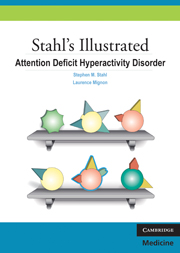Book contents
- Frontmatter
- Preface
- Contents
- CME Information
- Visual Vocabulary Legend
- Objectives
- Chapter 1 Neurobiology, Circuits, and Genetics
- Chapter 2 ADHD Across the Ages
- Chapter 3 Comorbidities of ADHD
- Chapter 4 ADHD Treatments
- Summary
- Appendix
- Abbreviations
- Suggested Readings
- Index
- CME Posttest
- Activity Evaluation
Chapter 3 - Comorbidities of ADHD
Published online by Cambridge University Press: 19 October 2021
- Frontmatter
- Preface
- Contents
- CME Information
- Visual Vocabulary Legend
- Objectives
- Chapter 1 Neurobiology, Circuits, and Genetics
- Chapter 2 ADHD Across the Ages
- Chapter 3 Comorbidities of ADHD
- Chapter 4 ADHD Treatments
- Summary
- Appendix
- Abbreviations
- Suggested Readings
- Index
- CME Posttest
- Activity Evaluation
Summary
The task of properly diagnosing ADHD might be impaired by the presence of comorbid disorders. While comorbid disorders might be even more prevalent in adults than in children with ADHD, they always need to be addressed simultaneously in order for an ADHD patient to reach full remission. At the same time, the presence of comorbid disorders sometimes prevents the proper diagnosis of ADHD by either masking the symptoms or by resembling the symptoms of the comorbid disorder(s).
This chapter will examine the different comorbidities that can be present in patients of all ages with ADHD, both in terms of mental and general health, and will elaborate on treatment priorities when comorbidities are present.
(A) D4 receptors in the PFC have been linked to altered working memory in ADHD and to hyperarousal in obesity. (B) Dysfunctional D2 receptors can lead to abnormal eating habits, substance use disorders, and behaviors such as risk taking and a hunger for reward. Furthermore, D2 receptors are downregulated in obesity, and D2 agonists can reduce obesity-related insulin resistance. (C) The cytokine IL-8 could be one molecule directly linking nutritional oversampling to ADHD. Obese patients have dysfunctional regulation of IL-8. In the hippocampus, IL-8 can dampen long-term potentiation (LTP), and it has been shown that inhibition of hippocampal LTP correlates with the development of ADHD and impulsive symptoms. Thus obesity could hypothetically precede or lead to ADHD.
The common link here is the molecule brain-derived neurotrophic factor (BDNF). BDNF is important in sleep regulation and dysfunction in BDNF can lead to EDS; additionally, BDNF mutant mice are obese and hyperactive, suggesting a role of this molecule in the regulation of food metabolism and behavior.
Following this line of research, treatment choices for obese patients with ADHD might therefore look toward the anorexigenic wake-promoting agent, mazindol, or toward TrkB receptor agonists, which act on the BDNF receptor and lead to an increase in central BDNF levels. Further research in this field will hopefully shed more light on this interesting molecule.
- Type
- Chapter
- Information
- Publisher: Cambridge University PressPrint publication year: 2009

